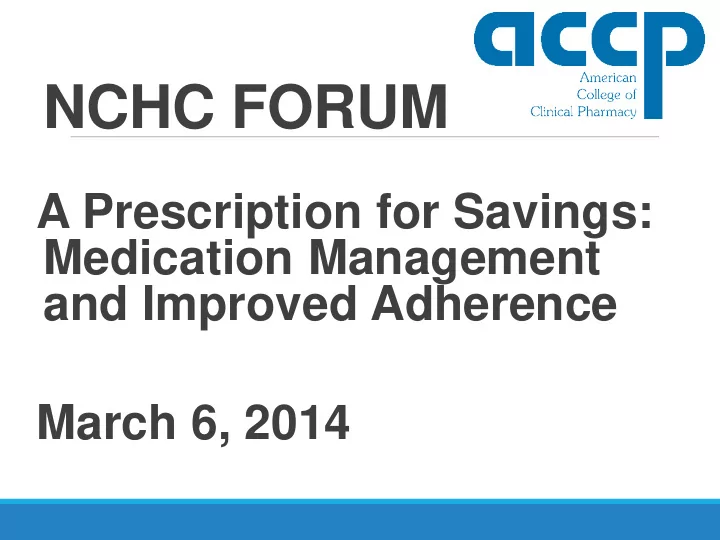

NCHC FORUM A Prescription for Savings: Medication Management and Improved Adherence March 6, 2014
The Scale of the Problem Drug-related morbidity and mortality costs exceed $200 billion annually Medicare beneficiaries with multiple chronic illnesses: ◦ See an average of 13 different physicians ◦ Have 50 different prescriptions filled per year ◦ Account for 76 percent of all hospital admissions ◦ 100 times more likely to have a preventable hospitalization…than those with no chronic conditions Anderson GF. Testimony before the Senate Special Committee on Aging. The Future of Medicare: Recognizing the Need for Chronic Care Coordination. Serial No. 110-7, pp 19-20 (May 9, 2007).
Over Half of Problems Result from Improper Medication Use 6.68% 6.83% 14.74% 56.86% 14.89% Category of Drug Therapy Problem Improper Use (Dose too low/Different or additional drug needed/Wrong drug) Non-Adherence Adverse reaction
Describing Drug Therapy Problems • Dosing “mistakes” that can result in under treatment and/or preventable adverse events • Inappropriate, ineffective, or unnecessarily costly medication choices • Duplicative or interacting medications • Avoidable side effects • Inconsistent adherence or other patient challenges that reduce treatment success
Comprehensive Medication Management (CMM) A direct patient-care service delivered by qualified pharmacists in formal collaboration with physicians and other members of the patient’s health care team to identify, resolve and prevent medication-related problems
Comprehensive Medication Management (CMM) • Identify and document medication-related problems, using a consistent care process that assures medication appropriateness, effectiveness and safety • Initiate, modify, monitor, and discontinue drug therapy to resolve problems and achieve medication-related outcomes that are aligned with the overall care plan and goals of therapy • Engage and educate patients and families in fully understanding and adhering to their medication regimen, supporting active patient engagement in the use of their medicines to achieve desired health outcomes
Identify, Resolve, & Prevent Drug Therapy Problems Appropriateness ◦ Eliminate unnecessary medications ◦ Initiate necessary medications not being taken Effectiveness ◦ Identify most effective medication in specific patient ◦ Increase dosages to effective levels Safety ◦ Eliminate toxicities ◦ Identify adverse reactions Adherence ◦ Increase patient’s willingness to adhere to medication regimen
Patients Who Benefit Most from CMM • Those who have not reached or are not maintaining the intended therapy goal • Those who are experiencing adverse effects from their medications • Those who have difficulty understanding and following their medication regimen • Those in need of preventive therapy • Those who are frequently readmitted to the hospital
CMM Coverage • Private Payers (integrated delivery systems like Kaiser Permanente and Geisinger Health System) •Veteran’s Health Administration • Indian Health Service • State Medicaid Plans (Minnesota, North Carolina) BUT NOT MEDICARE
Health Care Savings From CMM 11,804 patients (over 65 years old) 21,213 encounters # of events # of Health care savings* avoided referrals $ net savings Office visit ($182) 9,146 838 $1,512,056 Specialist visit ($564) 549 149 $225,600 Urgent care ($182) 263 7 $46,592 Emergency department visit 1,033 12 $838,241 ($821) Hospital admission ($29,046) 69 15 $1,568,484 Totals $4,190,973
Patient-Centered Primary Care Collaborative (PCPCC) • Dedicated to advancing an effective and efficient health system built on a strong foundation of primary care and the patient-centered medical home (PCMH) • Represents more than 1,000 medical home stakeholders including professional associations, health plans, employers, health systems, pharmaceutical firms, quality improvement organizations, and advocacy groups • Endorsed CMM as an essential component of care in the PCMH - “ Integrating Comprehensive Medication Management to Optimize Patient Outcomes” (http://www.pcpcc.net)
Institute of Medicine (IOM) “Pharmaceuticals are the most common medical intervention, and their potential for both help and harm is enormous. Ensuring that the American people get the most benefit from advances in pharmacology is a critical component of improving the national health care system .”
Thank You! John K. McGlew Director, Government Affairs American College of Clinical Pharmacy 1455 Pennsylvania Avenue, NW, Suite 400 Washington, DC 20004 Phone: 202.621.1820 jmcglew@accp.com
Recommend
More recommend